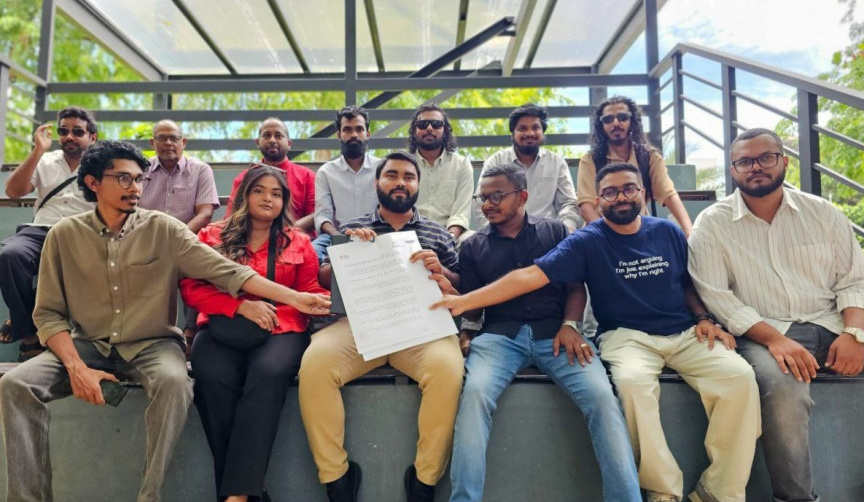
Journalists submit a petition against a proposed media bill on September 3, 2025. (Sun Photo/Maaniu Mohamed)
The Maldives Journalists Association (MJA) has submitted a petition endorsed by over 150 journalists, urging the Parliament to reject a contentious media bill that seeks to replace the existing self-regulatory system with a government-controlled commission.
On August 18, Thulhaadhoo MP Abdul Hannan Aboobakr, an independent lawmaker aligned with the government, submitted a bill that seeks to dissolve the Maldives Media Council (MMC) and the BroadCom, replacing them with a single regulatory body — a seven-member Maldives Media and Broadcasting Commission (MMBC), composed of four members elected by the media and three appointed by the President of the Maldives with parliamentary approval, with the President also given the authority to appoint the commission’s head. It also empowers the MMBC to impose major penalties against media outlets as well as individual journalists, including during the investigative stage.
The bill, widely panned both local and international journalism groups, is openly backed by the People’s National Congress (PNC) administration. The Parliament, which is currently in recess, held an extraordinary sitting amid protests on August 27, during which the ruling party used its supermajority to accept the bill and send it to the Independent Institutions Committee for review.
The petition, sponsored by Velidhoo MP Mohamed Abbas, was submitted to both the Parliament and the President’s Office on Wednesday afternoon.
According to the MJA, the petition was signed by 151 journalists from 41 media outlets.

Despite protests from journalists, the Independent Institutions Committee has set a September 15 deadline for the bill, with a 10-day window for public opinion, and a three-day window for consultation with stakeholders.
Both the members of the MMC and the BroadCom, who were summoned by the committee on Sunday, as well as media representatives, who were summoned on Monday, expressed concern over the planned changes.
In addition to allowing the President power over appointment of its members, the new bill also empowers the proposed commission to impose major penalties against media outlets as well as individual journalists, including during the investigative stage. This includes:
Following mounting pressure over the contentious provisions, President Dr. Mohamed Muizzu insisted that his administration remains “100 percent pro-media” and has no interest in controlling the press. He said that the administration would recommend amendments to the bill through the Attorney General’s Office, but has not committed to instructing the withdrawal the bill – as is demanded by journalists.